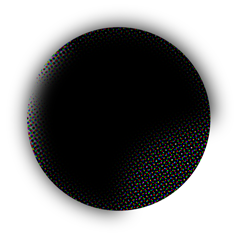Giant robots piloted by teenage girls? Check.
Fighting to save the world from a secret society? Check.
Deck building game? Check.
The indie card game Core Connection Sacred Machine Resonance: (神機共鳴 コア・コネクション) embodies the giant mecha genre and comes in a sleek package. Players begin as unknown pilots in mass produced robots, and later choose a famous pilot and ancient humanoid weapon known as “Resonant”. Together with their robot, they’ll battle the secret organization “Nebula’s Heart”. From the back of the box: choose from six pilots that grow in power as the game plays and six robots for a total of 36 variations. And when things get rough, unleash the pilot and robot’s true power.
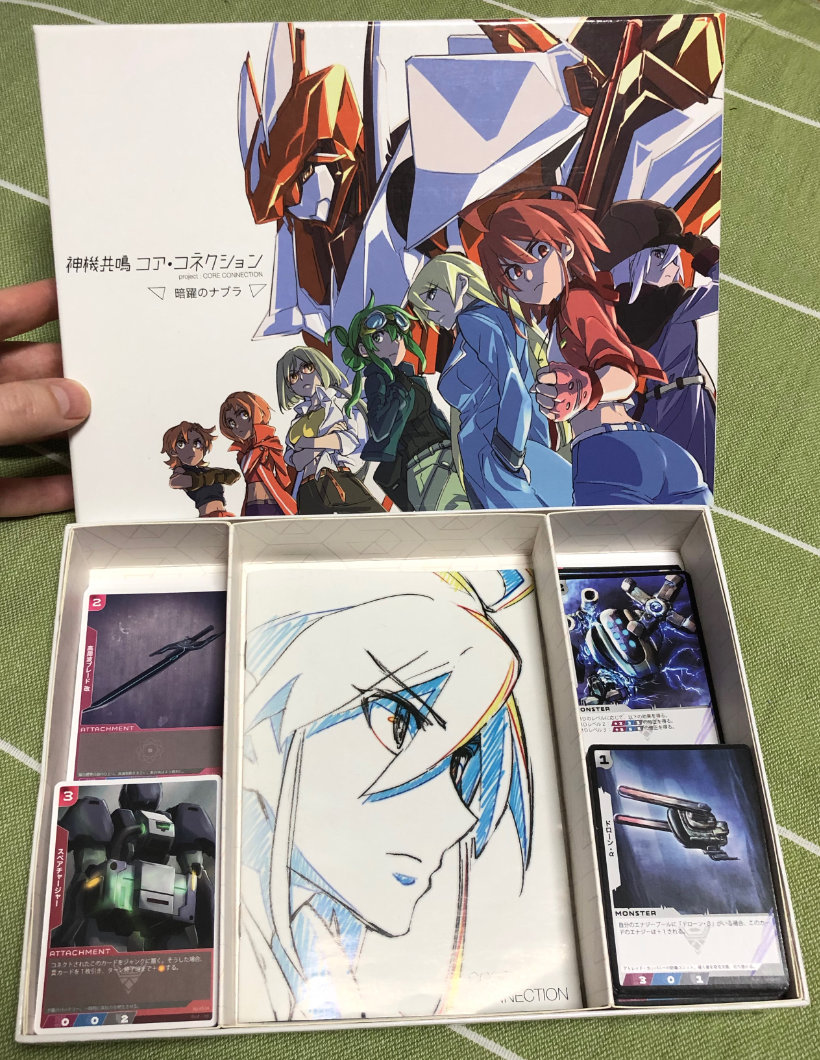
Contents
The sturdy 20cm x 27cm x 4cm box contains a total of 211 cards and a 27 page rulebook. The types of cards are:
- 10 Robot cards (7 types)
- 10 Pilot cards (7 types)
- 62 Attachment cards (17 types)
- 67 Tactics cards (19 types)
- 4 Story cards (4 types)
- 6 Resonance cards (6 types)
- 52 Monster cards (31 types)
Artwork
The artwork is very evocative of the genre. The slight translucency to the text background can make some cards slightly hard to read, though. There’s an teaser video here that highlights the art style:
Story
Two years ago Atlantis rose from the depths, and a group of seven girls fought against the Atlantean advance. Only those possessing the “Kings Wavelength” were able to pilot the ancient robots known as “Resonants”. Victorious, they returned to their normal lives until a new threat emerged– the secret organization “Nebula’s Heart”. This society seeks to eliminate those with the “King’s Wavelength.”
Rules
Players compete against each other for points, but there’s no direct conflict between players. Instead, they gain the points from besting monsters. This plays well to the genre where pilots are on the same team, but often jockey with each and have rivalries. The first player to have twenty more Energy than other players wins.
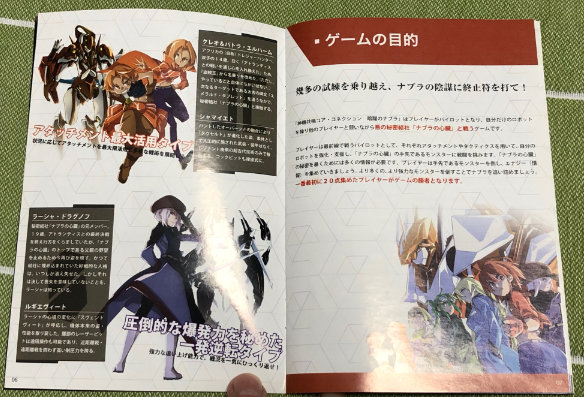
Types of Cards
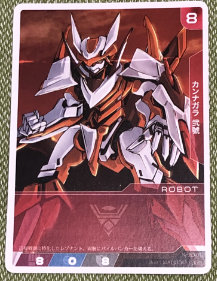
Robots have three combat attributes shown on the bottom left: Melee (近接値), Ranged (狙撃値), and Durability (耐久値). These three attributes, along with special abilities, makes each robot fight differently.
Pilots are also rated with the same three combat attributes as robots. The Robot and Pilot values, as well as attachments and tactics, are added together to determine the combat value. For example, a robot with Melee 3 whose pilot has Melee 2 has a total Melee of 5. A pilot card is placed on top of the robot they’re piloting.
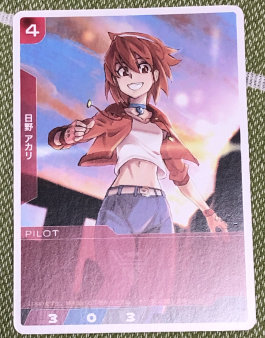
Attachments, as their name suggests, can be attached to a robot for a cost. They can provide modifiers to combat values and/or special abilities. Each robot can have a max of six attachments. Exceeding this limit requires an existing attachment to be discarded.
Tactics are cards that provide a bonus when played. Like attachments they have a cost, but unlike attachments they are temporary.
Story cards affect all players and only one can be active at a time. They remain active until each player has had a turn with the story in effect.
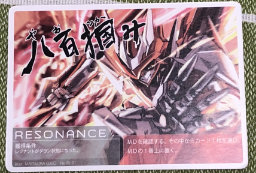
Resonance cards represent a robot and pilot exceeding normal limits. These have no cost to play, but do have conditions that must be met. They are temporary once activated, but can provide powerful benefits.
Monster cards come in three levels and have the same three combat attributes as robots. Each monster has an Energy rating, which a player receives when they defeat the monster.
Setup
Players begin with a “Mass Produced” robot and “Mysterious pilot card.” The “Established” pilots, “Resonant” robots, and Resonances are split into separate decks next to each other.
Each player gets their own initial deck with the same predetermined ten cards. The deck is shuffled and the player draws five cards to form their starting hand.
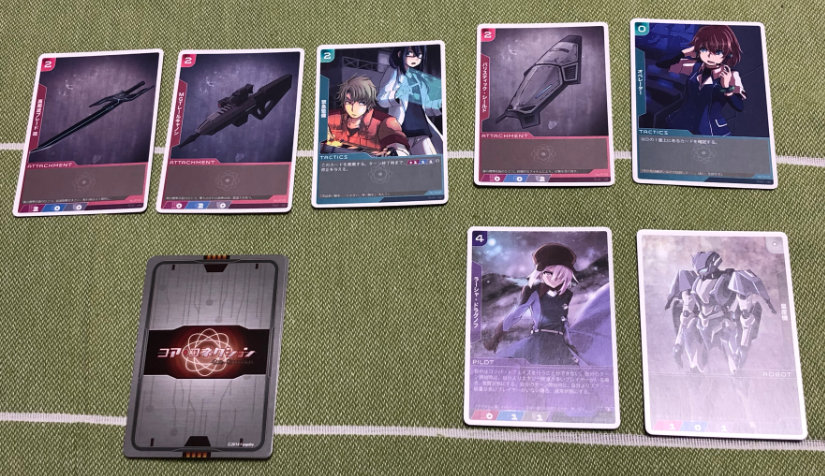
The HQ (Headquarters) deck, which is shared by all players, is shuffled together with the remaining Attachment, Tactics, and Story cards. Eight cards are then dealt face up to form the HQ area. Players draw new cards from the HQ area.
Finally, Monsters are divided up into three decks by level.
Gameplay
A player turn consist of four phases:
- Standard Phase
- Management Phase
- Combat Phase
- Down Phase
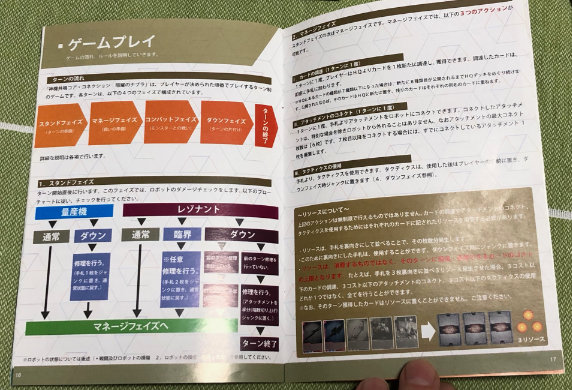
Standard Phase
The Standard Phase consists of performing a Damage Check on the robot. “Mass Produced” and “Resonant” robots have slightly different ways of handling this, detailed in a flowchart. The gist is play continues to the Management Phase unless a Resonant is Down, in which case repairs must be made. After Resonant repairs are made, the player’s turn ends.
Management Phase
Three actions can be performed in the Management Phase:
- Once per turn a card may be drawn from the HQ area and added to your hand.
- One Attachment may played from your hand and attached to a robot once per turn.
- Finally, any number of Tactics may be played from the player’s hand.
Many cards require resources, which can be gained by discarding cards. Each discarded card counts as one resource. Any number of cards whose cost is under the total number of resources can be played. For example, a player can discard two cards to get two resources. They can then play any cards that cost two or fewer resources.
Combat Phase
The Combat Phase is optional, and has four steps to it. The first is to determine if combat will be Melee or Ranged. The the top Monster card of the current monster level is flipped over. Battle then occurs and if the player was successful, they receive the monster card and place it in their energy pile.
Battle consists of comparing the chosen Combat Attribute (Melee or Ranged) of the player and monster against each other’s Durability attribute. If damage to the monster exceeds its Durability, it is vanquished and the player receives it as Energy. If the monster deals more damage than player Durability, the robot is damaged. Handling of damage varies between Mass-produced and Resonant robots in how its repaired. Mass-produced can be repaired by discarding a single card, while Resonant lose half their attachments. One of the benefits of Resonant is that they can take damage twice before being downed. After taking damage, they reach critical condition, which increases its abilities. Taking damage again results in downing it.
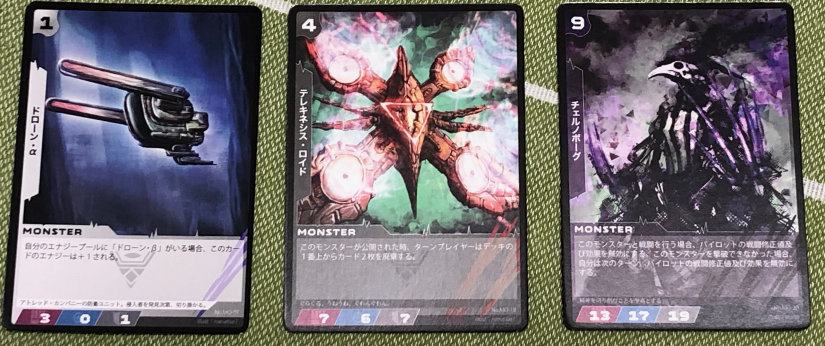
Monster levels increase to level two when all pilots are Established Pilots, and level three when all robots are Resonants.
Down Phase
In the Down Phase, any remaining cards in the player’s hand, temporary cards they’ve used, or cards they turned into resources and placed in their junk (discard) pile. They then draw five new cards, reshuffling their junk pile if there are no more cards to draw.
During the Down Phase, a player may choose an Established Pilot if they have at least four energy. If they have at least eight energy, they may choose a Resonant. These replace the “Mysterious Pilot” and “Mass-produced” cards, respectively. An Established Pilot and Resonant cannot later be changed. A player may collect a resonance card and add it to their hand if they meet its conditions.
Language
Though usually brief, the cards have rules text on them (their effects). Monsters tend to have more rules on them explaining special abilities.
The rule book contains some flavor text to set the mood and then launches into the rules, which are fairly easy to read. There are a number of graphics and diagrams as well.
Flavor Sample
ヨーロッパの科学者。20歳。アトランティスについての研究過程において知った「第七のレゾナント」を捜し、世界各地を飛び回る。
European scientist. Twenty years old. Travels the world searching for the “Seventh Resonant” that she learned of in her research of Atlantis.
Rulebook, p.5
Rules Sample
1ターンに一度、プレイヤーはHQよりカードを一枚新たに調達し、獲得できます。調達したカードは、即座に手札に加わります。
Once per turn, a player may procure one new card from HQ. The procured card is immediately added to their hand.
Rulebook, p.17
Card Sample
コネクトされたこのカードをジャンクに置く。そうした場合、カードを一枚引き、ターン終了時まで+リソースする。
Place this Connected card in the Junk pile. If you do, draw one card and receive an extra resource until the end of your turn.
“Spare Charger” Attachment Card
Acquiring
Published by the game circle Keepdry, it can be hard to find outside of conventions, but is sometimes available at local game shops.
| Core Connection: Sacred Machine Resonance | (神機共鳴 コア・コネクション) |
|---|---|
| Time | 45-60 minutes |
| Players | 2-4 |
| Ages | 12 |
| Maker | Keep Dry |
| @keepdry88 |
